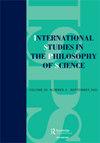古典文学的首要地位?索尔·克里普克遇见尼尔斯·玻尔
IF 0.8
2区 哲学
Q2 HISTORY & PHILOSOPHY OF SCIENCE
International Studies in the Philosophy of Science
Pub Date : 2019-10-02
DOI:10.1080/02698595.2020.1767890
引用次数: 0
摘要
摘要克里普克的部分真理理论为说者悖论提供了一个自然的解决方案,并对为什么说者句子似乎缺乏明确的内容做出了有吸引力的解释。然而,它似乎很容易受到反对,即它不能陈述关于部分真相的重要事实。我指出,同样的漏洞也感染了Garrett Birkhoff和John von Neumann等人开发的量子逻辑。人们经常声称,记录这些事实的唯一方法是在古典元语言中,但克里普克表明,同一种语言既可以作为部分真理的语言,也可以作为经典的二价语言。尼尔斯·玻尔在量子力学的背景下提出了一种解释,解释为什么我们需要对非经典系统进行经典解释,我认为这也适用于部分真理的情况。本文章由计算机程序翻译,如有差异,请以英文原文为准。
The Primacy of the Classical? Saul Kripke Meets Niels Bohr
ABSTRACT Kripke's theory of partial truth offers a natural solution of the Liar paradox and an appealing explanation of why the Liar sentence seems to lack definite content. It seems vulnerable, however, to the objection that it cannot state important facts about partial truth. I point out that the same vulnerability infects the quantum logic developed by Garrett Birkhoff and John von Neumann, among others. It is often claimed that the only way to record these facts is within a classical metalanguage, but Kripke showed that the same language can function both as the language of partial truth and also as a classically bivalent language. An explanation of why we need a classical explanation of a non-classical system was advanced in the context of quantum mechanics by Niels Bohr, and it applies also, I argue, to the partial truth situation.
求助全文
通过发布文献求助,成功后即可免费获取论文全文。
去求助
来源期刊

International Studies in the Philosophy of Science
HISTORY & PHILOSOPHY OF SCIENCE-
自引率
12.50%
发文量
10
期刊介绍:
International Studies in the Philosophy of Science is a scholarly journal dedicated to publishing original research in philosophy of science and in philosophically informed history and sociology of science. Its scope includes the foundations and methodology of the natural, social, and human sciences, philosophical implications of particular scientific theories, and broader philosophical reflection on science. The editors invite contributions not only from philosophers, historians, and sociologists of science, but also from researchers in the sciences. The journal publishes articles from a wide variety of countries and philosophical traditions.
 求助内容:
求助内容: 应助结果提醒方式:
应助结果提醒方式:


